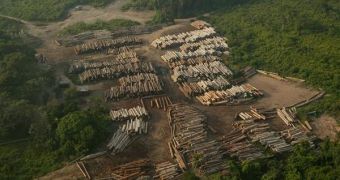A new paper published in a recent issue of the journal Global Change Biology-Bioenergy details how logging in temperate climates fuels climate change and global warming by destabilizing the carbon presently stored in forest soils across the world.
The researchers who investigated this issue explain that, once released from forest soils, the carbon works its way into our planet's atmosphere and contributes to said phenomena.
“Our findings demonstrate that mineral soil C can play an important role in C emissions, especially when considering intensive forest management practices,” they write in the Abstract to their paper.
Several other investigations have revealed that, as the permafrost begins to thaw, the carbon trapped in it is set free and ends up accumulating in the atmosphere.
However, little was known about the way logging affects the make-up of chemical soils.
“Our paper suggests the carbon in the mineral soil may change more rapidly, and result in increases in atmospheric carbon dioxide, as a result of disturbances such as logging,” Professor Andrew Friedland said, as cited by Mongabay.
About a month ago, scientists announced that atmospheric CO2 levels had hit a record 400 ppm for the first time in human history.
As a result, efforts are being made to switch from fossils fuels to more environmentally-friendly energy sources, one of them being wood fuel.
Professor Andrew Friedland and his fellow researchers say that, according to their investigation, turning to wood fire instead of coal or other dirty energy sources is likely to sooner or later backfire.
“Our paper suggests that increased reliance on wood may have the unintended effect of increasing the transfer of carbon from the mineral soil to the atmosphere.”
“So the intended goal of reducing carbon in the atmosphere may not be met,” the Professor summed up his and his colleagues worries.
The researchers’ conclusions are based on information collected while assessing the ecological footprint of forest management practices in the northeastern regions of the United States.

 14 DAY TRIAL //
14 DAY TRIAL //